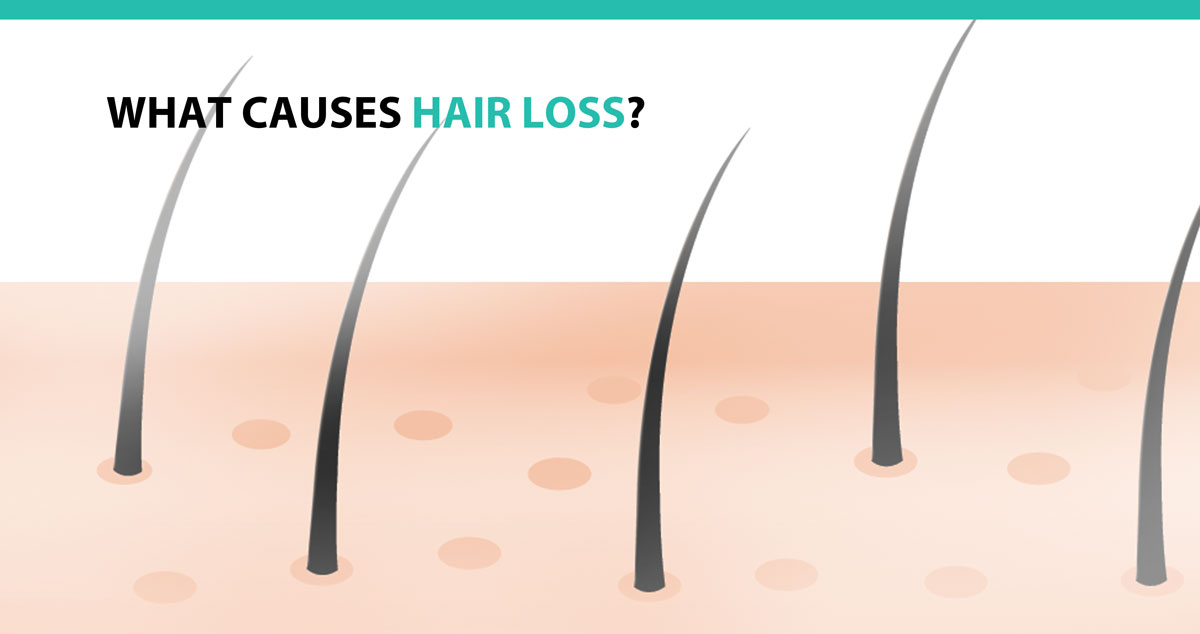
Over 50% of men tend to experience hair loss by age 50, and the number increases with an increase in age. While shedding 50-100 hair strands daily is normal, more than that indicates an underlying problem. Shedding copious amounts of hair, balding, or experiencing thinning usually signals abnormal hair loss that may require treatment. Below are some common causes of hair loss that will help you understand why it happens.
The Common Causes of Hair Loss Among Men and Women
- Genes
Androgenetic alopecia, also known as male pattern baldness is a type of hair loss that occurs as a result of your genetic makeup. It is hereditary, which means if your parents had it, chances are you’ll also experience it. The genes you inherit from your parents affect your hair follicles causing them to shrink and eventually stop hair growth. This type of hair loss not only affects men but also women. For men, hair loss begins at the temples and recedes backward. It may also begin as hair thinning at the top of the head. Normally, hereditary hair loss can start as early as after puberty for men, and after menopause for women.
- Stressful Events
Stressful events like divorce, loss of a loved one and even being diagnosed with a serious medical condition can all cause you a lot of stress. During this time, you may notice that you are shedding more hair when you brush or on your pillow when you wake up. This usually occurs when cortisol, a hormone produced when we are stressed, causes your hair follicles to go into the transition phase from the growth phase. As a result, large amounts of hair fall out in what is known as telogen effluvium. Hair loss due to stress is always temporary and your hair will grow back once your stress levels reduce.
- Nutritional Deficiency
Sometimes, what’s causing your hair loss lies in what you eat (or what you don’t). Some diets can lead to nutritional deficiencies causing hair to fall out. Diets that are too low in protein, iron, zinc, biotin, and vitamins like Vitamin A and D have been connected to hair loss. Hair loss resulting from nutritional deficiencies always starts gradually and can last for up to 6 months. Although dietary supplements can reverse hair loss from nutritional deficiencies, you should always consult a doctor before taking them.
- Infections and Medical Conditions
Scalp infections caused by fungi, yeast, or bacteria can affect the hair follicles causing redness pus and scarring, leading to hair loss. If you notice any of the above symptoms, it is crucial to seek treatment right away. STIs like syphilis can also lead to patchy hair loss not only on your head but also in other areas like eyebrows and even the inside of your nostrils Other medical conditions that can result in hair loss include thyroid disease, autoimmune disease, lupus, and irritable bowel syndrome.
While illnesses may result in your hair falling out, medications and treatments like chemotherapy for cancer, some hypertension medications, and gout’s colchicine have hair loss as side effects. If hair loss occurs when you start medication, inform your doctor so they can advise on better alternatives.
- Grooming
Haircare and grooming keep your hair looking good and manageable. However, some grooming practices can lead to hair loss due to trauma and inflammation. Tight hairstyles cause temporary hair loss known as traction alopecia while heat styling, hot oil, and chemical treatments can damage your hair follicles resulting in permanent hair loss.
Restore Your Lost Hair at Advance Medical Hair Institute
If you are experiencing abnormal shedding of hair, thinning or balding, all hope is not lost. DR. Joseph Williams can help you regrow your hair through advanced hair restoration procedures that are both reliable and highly successful. Schedule a consultation with us today!










